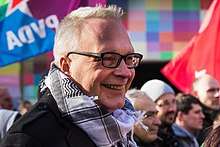Peter Mertens
Peter Mertens (born 17 December 1969) is a Belgian author and politician of the Workers' Party of Belgium (PVDA-PTB).
Peter Mertens | |
|---|---|
 Peter Mertens in February 2016 | |
| President of the PVDA-PTB | |
| Assumed office 2 March 2008 | |
| Preceded by | Ludo Martens |
| Personal details | |
| Born | 17 December 1969 Antwerp, Belgium |
| Political party | PVDA-PTB |
| Occupation |
|
Youth
Mertens was born in Antwerp. In 1987, when he was 18 years old, he founded the Studenten tegen Racisme (Students against Racism, SteR) with fellow UFSIA student Marc Spruyt. Four years later he joined the Marxistisch-Leninistische Beweging (Marxist–Leninist Movement, MLB), during the protests against the Gulf War. With this organisation he was also present at a wide range of student activities, like the solidarity campaign with the workers of the shipyard Boelwerf in Temse. In 1994 Mertens became the president of the MLB, which then participated in the strike movement against proposed reforms by the Minister of Higher Education in the government of the French community, Michel Lebrun.
Mertens obtained his licentiate in sociology in 1998 and started working as a temporary employee (interim work). For a year and a half he worked as a labourer for industrial cleaning firms and subcontractors in the Port of Ghent.[1]
Politician
In 1995 the 5th party congress of the PVDA-PTB took place and Peter Mertens was elected to the National Council of the party. He left his position as president at the MLB in 1998 and became political secretary in the party branch of the province of Antwerp. In 2002, at the 7th party congress, Mertens was elected to the party bureau. Another four years later he became responsible for the daily management of the party.
During the 8th party congress on 2 March 2008 Mertens was officially appointed as the successor of Ludo Martens, who was having serious health problems.[2] After his appointment, Mertens declared in the Dutch language newspaper De Morgen that his party would leave behind its pedantic attitude and the big theories. As president he wanted to rethink the position of the party, in the process abandoning any connection to Maoism and Stalinism.[3] To present the new vision and direction of the party he wrote the book Op Mensenmaat (On a human scale). Its successor, Hoe durven ze? (How dare they?), appeared in December 2011 and became an instant hit.[4] After half a year 17.000 copies were sold and in 2012 Mertens received the Jaap Kruithof Prize for this work.
At the local elections of 2012 he was on top of the list for the municipal election in the city of Antwerp and was elected with 8.976 preference votes.[5] This made him the fourth most popular politician in Antwerp, behind Bart De Wever, Patrick Janssens and Filip Dewinter.[6]
In 2016, he clearly distanced himself from his predecessor Ludo Martens who used to praise Joseph Stalin.[7]
Bibliography
- De Belgische vakverenigingen tijdens en na de Tweede Wereldoorlog (The Belgian workers' unions during and after World War 2, Gent, 1993)
- Het fascisme gisteren en vandaag (Fascism yesterday and today, EPO, 2000) Herwig Lerouge, Peter Mertens e.a. ISBN 9064452024
- De arbeidersklasse in het tijdperk van de transnationale ondernemingen (The proletariat in the age of transnational corporations, Imast, 2006)
- Op Mensenmaat (Stof voor een socialisme zonder blauwe plekken), (On a human scale, EPO, 2009) ISBN 9789064455070
- Hoe durven ze? (De euro, de crisis en de grote hold-up) (How dare they?, EPO, 2011) ISBN 9789491297137
- Graailand (Het leven boven onze stand) (Grabland, EPO, 2016) ISBN 9789462670884
Notes
- "Peter Mertens nieuwe voorzitter PVDA". De Morgen (in Dutch).
- "PVDA beschouwt zich niet langer als extreem linkse partij". pvda.be (in Dutch). Archived from the original on 2014-11-12. Retrieved 2014-09-28.
- "Communist schrijft bestseller". De Standaard (in Dutch).
- http://www.vlaanderenkiest.be/index.html#/gemeente/11002/uitslagen
- "Het onverhoopte succes van Peter Mertens". radio1.be (in Dutch).
- https://www.knack.be/nieuws/belgie/zijn-regeringspartijen-zo-bang-van-pvda-dat-feiten-niet-langer-van-tel-zijn/article-opinion-796297.html
External links
![]()